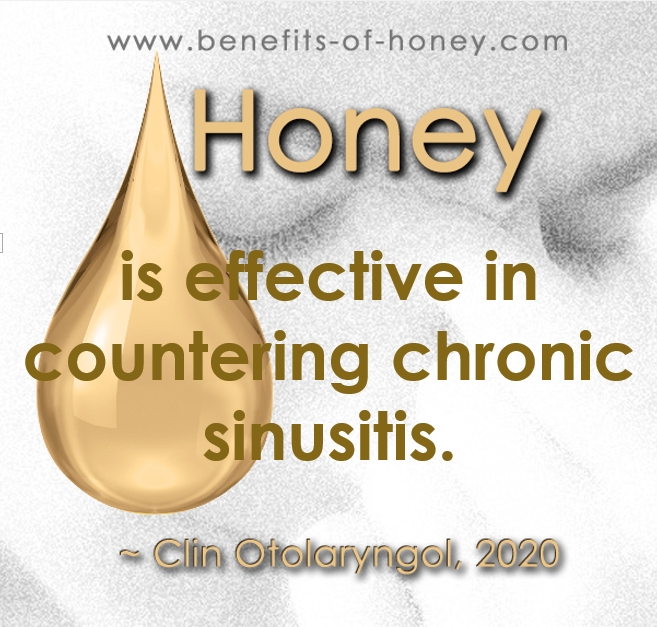sinus treatment
Honey Aids Sinus Treatment
Hope of a natural sinus treatment is on the horizon.
Sinus is an inflammation of the nasal passages and the air spaces in the bones around the nose and eyes. Every year, over 30 million Americans suffer from sinus and spend millions of dollars for prescription and over-the-counter medications such as amoxicillin and steroid nose spray to find relief from their sinus symptoms.
Honey users who used to suffer from frequent, sporadic spells of uncontrollable leaky nose and bouts of sneezing fits have shared about the effectiveness of honey in treating their sinus condition that plagued them since they were young. After about a year of taking a tablespoon of honey before bedtime, the occurrence of these erratic sinus symptoms gradually became rare for them. And even when it did strike, it came in a much milder wave. Could the drastic improvement really be attributed to the daily dosage of honey? Read on to learn what evidence science is turning up to prove honey’s medicinal benefits for sinusitis.
Honey for Stubborn Sinus Symptoms

If you or someone you love lives with cystic fibrosis–associated chronic rhinosinusitis (CF-CRS), you know how tough recurring sinus infections can be. A randomized pilot trial published in Clinical Otolaryngology offers encouraging news: manuka honey sinus irrigations were well-tolerated and showed promising early benefits compared with saline alone.
The study at a glance
- Who? Adults with CF-CRS who had prior sinus surgery
- What? Twice-daily high-volume sinus rinses for 30 days: 10% medical-grade manuka honey vs saline
- Where? Tertiary rhinology clinic
- Primary goals: Feasibility (can patients use it, will they stick with it, is it comfortable?)
- Effectiveness measures:
- Quality of life (SNOT-22)
- Endoscopic healing score (Lund-Kennedy)
- Post-treatment sinus culture results
Key results
- Well-tolerated: Patients reported good comfort and strong adherence; only mild, occasional stinging with honey.
- Better endoscopic healing: The honey group had a significantly greater improvement on endoscopic exam than saline (notably less crusting and inflammation).
- Quality of life improved: The honey group achieved a clinically important improvement in SNOT-22; saline did not. (Between-group difference wasn’t statistically significant in this small pilot.)
- Cultures are hard to clear: Neither group reliably eradicated bacteria—unsurprising given CF biofilms—but two honey patients lost Pseudomonas aeruginosa on post-treatment cultures, a signal worth studying further.
Why might honey help?
Medical-grade manuka honey brings a unique toolkit: broad-spectrum antibacterial action, biofilm disruption, and anti-inflammatory and antioxidant effects—without fostering antibiotic resistance. In high-volume rinses after sinus surgery (which improves access to the sinus cavities), honey may reach problem areas more effectively.
What this means for you
For CF-CRS patients already using saline rinses, adding medical-grade manuka honey (10% v/v) looks like a promising natural adjunct—especially for reducing crusting and improving day-to-day symptoms. This was a pilot study (small by design), so larger multi-center trials are the next step. But the combination of tolerability, safety, and early benefits makes manuka honey a compelling option to discuss with your ENT.
Nature’s remedy is earning modern evidence and honey’s long history as a healing aid now has early clinical support in sinus care. The evidence is encouraging, for stubborn, biofilm-prone sinus disease like CF-CRS, honey may help you breathe and live a little easier.
Early Study Touts Honey as Effective Sinus Treatment
2008, OTTAWA (AFP) — Honey, used in tea or hot water in Canada for generations to soothe sore throats, could soon be substituted for antibiotics in fighting stubborn ear, nose and throat infections, according to a new study.
Ottawa University doctors found in tests that ordinary honey kills bacteria that cause sinus infections, and does it better in most cases than antibiotics.
“It’s astonishing,” researcher Joseph Marson said of bees’ unexplained ability to combine the nectar of flowers into a seemingly potent medicine.
The preliminary tests were conducted in laboratory dishes, not in live patients, but included the “superbug” methicillin-resistant Staphylococcus aureus or MRSA, which is highly resistant to antibiotics.
In upcoming human trials, a “honey rinse” would be used to “flush out the goo from sinus cavities,” said Marson in an interview with AFP.
The researchers have so far tested manuka honey from New Zealand, and sidr honey from Yemen.
The two killed all floating bacteria in liquid, and 63-91 percent of biofilms — microorganisms that sometimes form a protective layer in sinus cavities, urinary tracts, catheters, and heart valves, protecting bacteria from normal drug treatments and often leading to chronic infections.
The most effective antibiotic, rifampin, killed just 18 percent of the biofilm samples in the tests.
“As of today, nobody is sure what in the honey kills the bacteria,” Marson said, noting that “not all honeys have the same potency” and calling for more research to determine the mechanism behind the healing.
Canada’s clover and buckwheat honey did not work at all. Previous studies have shown honey’s healing properties on infected wounds.
The results of the study were presented this week at the annual meeting of the American Academy of Otolaryngology-Head and Neck Surgery, in Chicago.